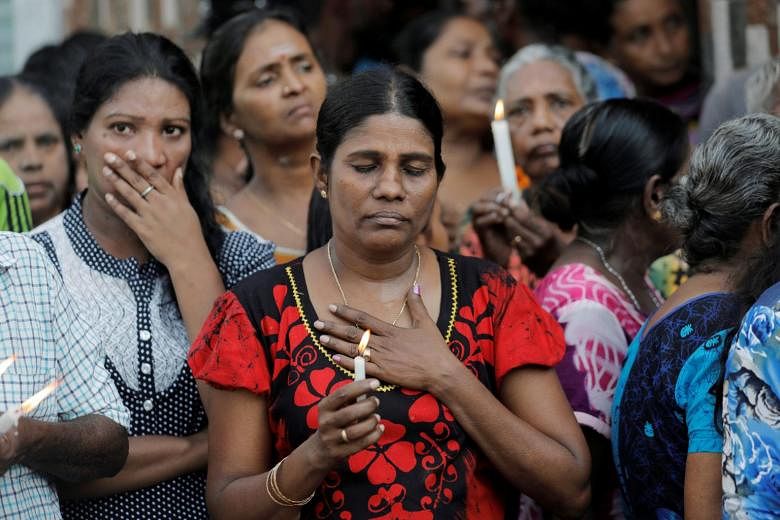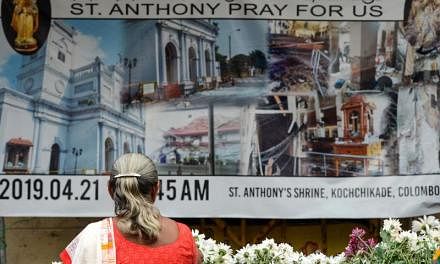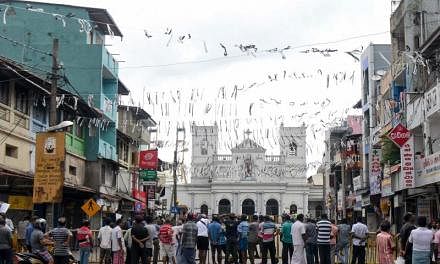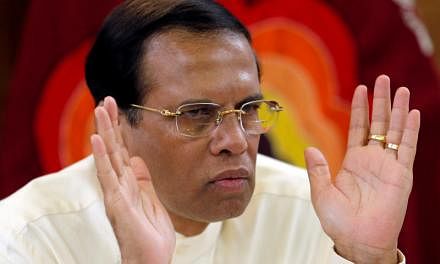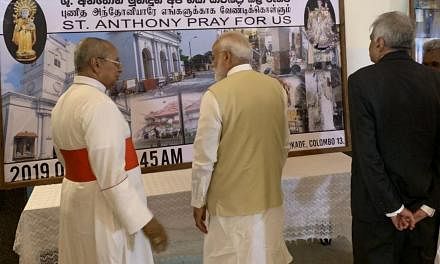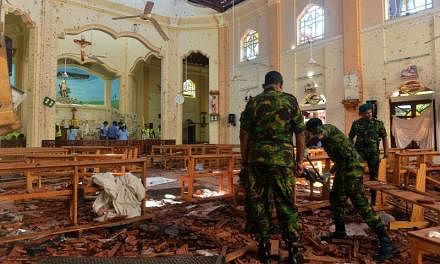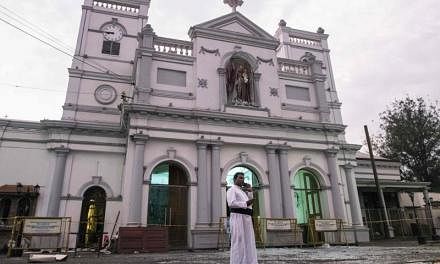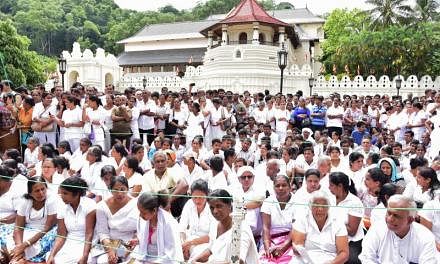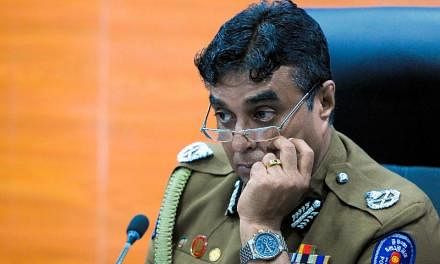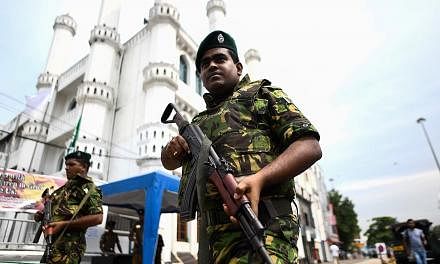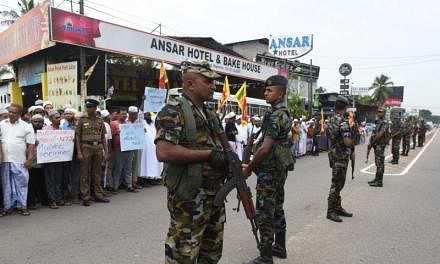COLOMBO (AFP, WASHINGTON POST) - Sri Lankans across the island nation observed three minutes of silence early on Tuesday (April 23) to pay tribute to about 300 people killed in a string of suicide attacks.
National flags were lowered and people bowed their heads as the silence began at 8.30am local time (11am Singapore time), the time the first of six attacks occurred on Sunday.
The government has declared a full day of national mourning on Tuesday, with flags at all government institutions lowered to half mast, liquor shops ordered shut and radio stations and television channels expected to play sombre music.
At St Anthony's Shrine in Colombo where the first suicide bomb detonated on Sunday morning, a crowd of several dozen people held up candles and prayed silently, palms pressed together, eyes squeezed shut.
Some of them struggled to hold back tears, and as the three minutes drew to a close, the crowd began to recite prayers.
A curfew has been imposed from 8pm on Monday until 4am on Tuesday.
Sri Lanka on Monday accused a local Islamist extremist group, the National Thowheeth Jama'ath (NTJ), of being behind the string of Easter bombings at churches and hotels.
A Sri Lankan state minister for defence said the death toll has risen to 311, from 290 on Monday.
FBI agents are being sent to assist Sri Lankan police in their investigation, according to a law enforcement official. The FBI has also offered laboratory expertise in testing some of the bomb evidence, and analysts have been scouring FBI databases for any pieces of information that could shed additional light on the plotters, officials said.
Health Minister Rajitha Senaratne said the Islamist group used suicide bombers at three churches and three hotels. He added that a foreign network was probably involved.
"We do not believe these attacks were carried out by a group of people who were confined to this country," Mr Senaratne said. "There was an international network without which these attacks could not have succeeded."
He called for the police inspector general, Pujith Jayasundara, to resign because security agencies had received a report warning of attacks by this group on churches and hotels weeks earlier.
President Maithripala Sirisena said he would seek "international assistance" with the investigation. Intelligence agencies have reported that "international organisations" were behind these "acts of local terrorists", his office said in a statement.
The statement also said the government would implement anti-terrorism measures that give police additional powers, effective at midnight.
Attention is focusing on why and how the government and security forces were unable to foil the coordinated bombings. Two officials provided The Washington Post with the three-page intelligence report that the health minister alluded to, in which a senior police official warned of potential suicide attacks by the same Islamist extremist group.
The report also identified several members by name, including the group's alleged leader. Mujibur Rahman, an MP who was briefed on the report, said it was based on information from Indian intelligence agencies.
Officials said 24 suspects have been taken into custody for questioning, news agencies reported.
The authorities said the main attacks - on churches and hotels - were carried out by seven suicide bombers.
A Sri Lankan security official characterised NTJ as a shell for the Islamic State in Iraq and Syria (ISIS), and said it has been active in Kattankudy, an area in the eastern part of the country and home to one of its largest Muslim populations.
The group's leadership is believed to be based there, the official said.
The official said there could be additional explosives or potential suicide bombers.
NTJ "wasn't on anyone's radar", said Michael Leiter, who served as director of the National Counterterrorism Center in the Bush and Obama administrations. He said the attack probably had an international nexus, given that not only Sri Lankans were targeted.
"It wouldn't surprise me either if there were at least a couple of people who had travelled to Syria," Leiter said. "There was never a large Sri Lankan population there, but it only takes one or two to return and inspire a local group to align itself ideologically and tactically with a global violent jihadist organisation."
But the absence of any clear claim of responsibility from an established international terrorist organisation suggests it might be too soon to say whether the Sri Lankan bombers had outside assistance, said Nicholas Rasmussen, a former senior director for counter-terrorism on the National Security Council who also ran the National Counterterrorism Center in the Obama and Trump administrations.
"But it wouldn't take much - a connection between Sri Lankan foreign fighters in Syria with like-minded people back home - in order to create such a connection," Rasmussen said. He added that the high death toll and simultaneous attacks suggested a degree of sophistication in bombmaking and organisation, which are "characteristic of an established group".
The SITE Intelligence Group, which tracks extremist activity online, said on Monday that an unidentified ISIS supporter distributed photos of three alleged "commandos" involved in the Sri Lanka attacks. The photos were posted in pro-Islamic State chat rooms, and the men, pictured holding weapons in front of Islamic State banners, were described as "among the commando brothers in Sri Lanka", SITE said.
The group reported on Sunday that ISIS supporters were portraying the attacks as revenge for strikes on mosques and Muslims.
A huge number of the dead were worshipers at St Sebastian's Church in Negombo, north of Colombo; officials reported at least 104 killed there.
In a sign of rising tensions in the wake of the attacks, 22 Muslim refugees from Pakistan living in Negombo faced threats and intimidation from a group of local residents. Police arrived and separated the two groups, said Kosela Navaratna, the officer in charge at the Katana police station in Negombo. The refugees are in police protection.
